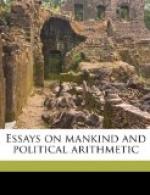about (as strong as any in Europe, which would cost
but a million, or about a penny in the shilling of
the house-rent for one year) what foreign prince could
bring an army from beyond seas, able to beat—1.
Our sea-forces, and next with horse harassed at sea,
to resist all the fresh horse that England could make,
and then conquer above a million of men, well united,
disciplined, and guarded within such a wall, distant
everywhere three-quarters of a mile from the housing,
to elude the granadoes and great shot of the enemy?
2. As to intestine parties and factions, I suppose
that 4,690,000 people united within this great city
could easily govern half the said number scattered
without it, and that a few men in arms within the
said city and wall could also easily govern the rest
unarmed, or armed in such a manner as the Sovereign
shall think fit. 3. As to uniformity in religion,
I conceive, that if St. Martin’s parish (may
as it doth) consist of about 40,000 souls, that this
great city also may as well be made but as one parish,
with seven times 130 chapels, in which might not only
be an uniformity of common prayer, but in preaching
also; for that a thousand copies of one judiciously
and authentically composed sermon might be every week
read in each of the said chapels without any subsequent
repetition of the same, as in the case of homilies.
Whereas in England (wherein are near 10,000 parishes,
in each of which upon Sundays, holy days, and other
extraordinary occasions there should be about 100 sermons
annum, making about a million of sermons per annum
in the whole) it were a miracle, if a million of sermons
composed by so many men, and of so many minds and
methods, should produce uniformity upon the discomposed
understandings of about 8,000,000 of hearers.
4. As to the administration of justice.
If in this great city shall dwell the owners of all
the lands, and other valuable things in England; if
within it shall be all the traders, and all the courts,
offices, records, juries, and witnesses; then it follows
that justice may be done with speed and ease.
5. As to the equality and easy levying of taxes.
It is too certain that London hath at some time paid
near half the excise of England, and that the people
pay thrice as much for the hearths in London as those
in the country, in proportion to the people of each,
and that the charge of collecting these duties have
been about a sixth part of the duty itself.
Now in this great city the excise alone according
to the present laws would not only be double to the
whole kingdom, but also more equal. And the
duty of hearths of the said city would exceed the
present proceed of the whole kingdom. And as
for the customs we mention them not at present.




